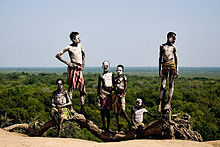Karo people (East Africa)
 |
|
| Total population | |
|---|---|
| (approximately 1 million) | |
| Regions with significant populations | |
| South Sudan | |
| Languages | |
| Bari language | |
| Religion | |
|
Traditional African religion, Christianity |
|
| Related ethnic groups | |
| other Nilotic peoples, esp. the Pojulu, the Kakwa, the Nyangwara, the Mandari, and the Kuku |
The Bari people, also known as the Karo, are a Nilotic ethnic group mainly inhabiting South Sudan, as well as adjacent parts of southwestern Ethiopia. They are known as the Duor by other communities occupying the savanna lands of the White Nile. The Bari speak the Bari language as a mother tongue, which belongs to the Nilo-Saharan family.
The Bari of the Nile are sedentary agro-pastoralist. They exploit the savanna lands along the river Nile, and up to 40 miles east and west of the Nile. The Bari economy is based on subsistence mixed farming; their domestic livestock (small and large) are mainly raised for supplementing food, but mostly as a socio-economic and financial investment. Notably, livestock are exchanged as gifts in marriages, and other social functions or sacrificed in celebrations, and funerals; and whenever the need arises they are sold for cash.
The Bari are consistently under pressure: now from modern urbanization annexing their green lands and infusing different cultures into their lifestyles; and historically the Baris have been devastated by slave traders, and forced by Belgians (especially from the Lado Enclave) into labor camps and used as porters to carry ivory tusks to the Atlantic coast. The two (1955–1973; 1983–2005) have also affected the Bari social, economic and financial dynamics.
War (intertribal or resisting foreigners) is not alien to Bari history. Generally, the Bari have co-existed well with the neighboring ethnic groups, but have had to pick up arms to defend their land against slave traders, and plundering warriors. There is documentation of Bari resistance against invasion by Dinka, Azande (Zande), and numerous encounters with Turkish slave traders.
Traditionally the Baris believe in one almighty God and existence of powerful spirits (good and evil). Today the Bari's demography is made up of Christians (Catholics and Protestants), Muslims, and followers of traditional religions (not organized).
...
Wikipedia
